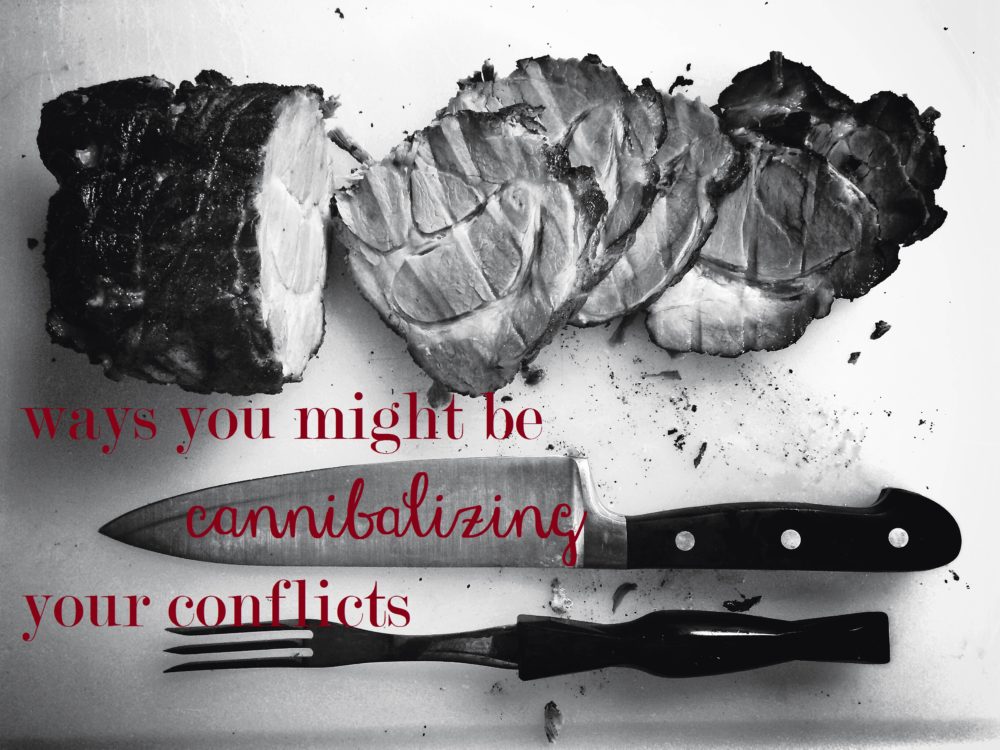I’m grateful to Peacemakers and their superb conflict coaching trainings for many of these invaluable insights.
Conflict is everywhere. And as my desires and, well, sin runs into other people’s, in conflict spoken or unspoken–I’m realizing something. Godly responses to conflict are pretty much all counter-natural–or more specifically, super-natural.
They beg an overhaul of what I typically want to do: You know, stuff like hand someone the silent treatment they have so justly deserved. Eloquently let my children (and possibly the neighbors) know exactly HOW they have trodden on my kingdom. Burn a bridge that isn’t that important to me anyway, I’ve decided.
Conflicts are full of such…loss. But would you believe me if I told you they’re an opportunity?
Conflict is a horizontal outworking of something God’s doing in me vertically (or sadly, what I’m lacking). Why does conflict matter?
Conflict, more specifically God’s conflict, is at the center of why God sent Jesus. And how we respond to the breaking of relationship is an expression of the Gospel. It’s a chance to honor God, to love others well, to grow more like Jesus, and to just find some practical solutions.
So I’m scribbling these down as a few reminders to myself as you glance over my shoulder–and just thankful for a God who cared enough to get dirty for me, to absorb my guilt when I’d positioned myself as enemy.
Here are some ways to actually cannibalize the–dare I say it?–latent beauty that can blossom from conflict.
1. Confronting or responding through any written word or social media. My husband, a trained mediator, describes the hazards of text-only communication by explaining that a significant portion (some estimate 70%) is nonverbal. Imagine how much can be misunderstood by subtracting 30%! Even if you’re a gifted communicator, words are never the same as seeing someone before your eyes, communicating the emotion and value that only physical presence can afford (…no matter how many emoticons you’ve got at your disposal). God handled His own conflict with us by sending Himself into our mess, in the flesh.
2. Assuming the worst. I’ve written before about the social psychological principle that when we mess up, we tend to attribute it to our circumstances. But when other people mess up, we tend to attribute it to their character. That’s just the kind of person she is.
But that’s only part of how our assumptions sabotage us. People have malicious intent much less often than we give them credit for! Gently asking questions about others’ motivations rather than assuming they meant harm can save us tremendous misunderstanding. Having been on both painful ends of mistaken assumptions, I am slowly learning all I don’t know—and beginning to treat my relationships with the dignity they deserve of gently asking when I wonder about someone’s motives. It’s a chance for both of us to realize the ways we inadvertently, consistently leave a wake.
3. Posing [for peace]. On the spectrum of “peace-breakers,” “peace-makers”, and “peace-fakers”, my weaknesses definitely tend toward the latter (er, with the exception of conflicts with my kids). I’d rather fake peace for my own comfort, to seem right, or because, sadly and truthfully, I’m indifferent enough to the relationship or person to dive deeper into the opportunity that is conflict. I’m not truly overlooking and graciously forgiving; I am hardening and distancing. God didn’t fake the severity of my conflict with Him, but chose to change me and honor Himself through it. He valued me enough to care about my holiness. Am I really extending grace, or am I glossing over and stuffing deeper?
4. Cleaning the surface. When we address only the presenting problem of the conflict and not the true interests and hurts and questions beneath it, it can be like slapping a Band-Aid on an infected wound and calling it good. Sometimes it may go away—but a lot of times it gets worse and/or repeats itself in another avatar.
Grab Part II here!









2 Comments
aperse1 - 9 years ago
I think it may be fair to say that if Yeshua asked any long standing believer if they would like to do something great for him, it would be met with a resounding “yes,” and if he were to repeat that question with emphasis on it truly glorifying him and helping him do kingdom work, I imagine the intensity of the “yes” to only increase in its desire. But what if the working of this miracle doesn’t look like anything that God might have his hand on? It’s ugly and hurtful and it is fraught with misunderstandings, miscommunications, anger and pain and bitterness. But the plans and love of the Lord are so great, how can we as mere humans begin to understand that which we only see with our eyes or feel with our hearts? Proverbs 19:21 Many are the plans in a person’s heart, but it is the LORD’s purpose that prevails. When God calls us into a storm, we must keep our eyes on him and do our best to ignore the crashing waves around us, for he who sees and knows all, always has a plan that supersedes anything we can imagine…truly making beauty out of ashes…so many ashes. Ephesians 6:12 We wrestle not against flesh and blood…”when we believe people are the enemy, we leave the true enemy unopposed.” Lisa Brever #girlswithwords
Beyond thankful for his plans…for his discipline that brought me to the end of myself and to salvation. Like me, even the Pharisees did not think they were deceived. God works best in the most broken and ugly and deceived places, that is where his power truly reforms…making beauty out of ashes. If only we could pan back and realize that when God uses us to do his miraculous work, it may not look the part, but it IS every part of his master plan, and the miracle unfolds, glorifying the Lord in so many ways. There is so much to rejoice over even in the midst of pain and correction!
So thankful for those who sacrifice much for the kingdom work!!
6 ways to take your relationships deeper in 2016, Part II | a generous grace - 9 years ago
[…] squeeze me into the discipline of returning a blessing for an insult; of loving extravagantly (click here for ways you may be cannibalizing your own conflicts). I am fascinated by this thought from Ligon Duncan that tells me a lot about relationships in […]